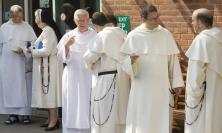Since Vatican II, the Church’s guidelines for doing and teaching theology have called for close attention to lived experience, which should inform a courageous discernment of the ‘signs of the times’ in the light of the gospel. Cardinal Michael Czerny SJ rereads the magisterial guidance regarding theological research and formation for ministry: what is the pastoral and dialogical approach that theology is called to take?
This text proposes to reflect on the style of dialogue that, since the Second Vatican Council, has informed magisterial reflection on theology and theological formation. On this basis, then, we will examine various forms of dialogue and renewal within an ecclesiastical or theological faculty. The reflection will culminate with the dialogue which is theology docile to the Spirit.
Beginning at Vatican II
In order to grasp the renewal represented by the theme of dialogue in the articulation of Vatican II and the post-conciliar magisterium, it is appropriate to note the significant paradigm shift that occurred in Dei verbum: with the Dogmatic Constitution on Divine Revelation, the Church put an end to the defensive attitude that, since the advent of modernity, had conditioned its way of doing theology, leading it to conceive of itself as a stronghold besieged by internal and external enemies. Halting this path traced by Catholic apologetics in the aftermath of Trent, the council fathers preferred to adopt a more dialogical and constructive tone. Proof of this is the fact that they avoided any kind of anathema, for it was with benevolence and confidence that the council looked at today’s reality and the world.
Even in the way it presents revelation, Dei verbum testifies to a newfound biblical sensitivity[i] that – distancing itself from the abstract arguments of controversial theology – emphasises the initiative and the will with which God communicates himself to humanity, inviting us to enter into relationship and communion with him.
In Lumen gentium, the Church understands herself as the ‘people of God’ called to spread the good news of the gospel to all people on earth, while in Gaudium et spes (GS) she becomes once again aware of herself as a dynamic reality, involved in the present, and therefore called to enter into dialogue with the world, with the whole of humanity, challenged to rediscover continuously her authentic identity. Certainly, dialogue is intended to make the proclamation of the gospel more effective, but it is even more necessary to intercept the signs of Christ’s presence that appear in history. The exercise of evangelical discernment – which the faithful exercise with the sensus fidei, their instinct of faith – allows us to ‘to hear, distinguish and interpret the many voices of our age, and to judge them in the light of the divine word,’ so as to discover in human social life a locus, a place and a counterpoint, in which the Church has the opportunity to know herself more deeply in the ‘constitution given her by Christ’ so ‘that she can understand it more penetratingly, express it better, and adjust it more successfully to our times.’ (GS §44)
The great change that Vatican II introduced in the way the Church presents itself to the world could not fail to have enormous repercussions on the way of understanding theology as formation for ministry, whether ordained, religious or lay.
Dialogue within the teaching Church
Vatican II’s decree on priestly training, Optatam totius (OT), is emphatic that ecclesiastical studies ‘be more suitably aligned and … harmoniously work toward opening more and more the minds of the students to the mystery of Christ. For it is this mystery which affects the whole history of the human race, [and] continually influences the Church’ (OT §14).
To implement this conciliar decree, Pope Paul VI prepared an apostolic constitution meant to orient and direct ecclesiastical studies in the light of the council. The foreword of Sapientia Christiana (SC) draws especially on the council’s Gaudium et spes and Gravissimum educationis, and on Paul VI’s encyclicals Evangelii nuntiandi (EN) and Populorum progressio.
The Church of Christ strives to bring the Good News to every sector of humanity so as to be able to convert the consciences of human beings, both individually and collectively, and to fill with the light of the Gospel their works and undertakings, their entire lives, and, indeed, the whole of the social environment in which they are engaged. (SC §I quoting EN §18 and GS §58)
However, Paul VI did not have the time to promulgate Sapientia Christiana, so this was taken up by his successor, John Paul II, in the first year of his pontificate, and published on 15 April 1979.
Nearly forty years later, aggiornamento or renewal is urgently needed, and Pope Francis offers it ‘with thoughtful and prophetic determination’ in an apostolic constitution ‘on ecclesiastical universities and faculties’ entitled Veritatis gaudium (VG), signed on 8 December 2017. Eighteen months later, Pope Francis commented on it himself, when he addressed a conference in Naples at the San Luigi Section of the Pontifical Theological Faculty of Southern Italy.[ii]
Taking up the former documents, the foreword of the new constitution adds highlights of the Church’s social teaching from: John Paul II’s Laborem exercens, Sollicitudo rei socialis and Centesimus annus; Benedict XVI’s Caritas in veritate; and Pope Francis’s Evangelii gaudium, Laudato si’, and we can add the more recent Fratelli tutti.
With Evangelii gaudium, Pope Francis declares the need to rethink every area of ecclesial activity in a missionary key. Theological studies must embrace this priority and accept the challenge of confronting the new configuration of the world that keeps on emerging from globalisation, a process which began coming to light about ten years after the council.[iii]
It is on the teachings of Vatican II that Pope Francis draws, his gaze fixed on today’s major challenges to humanity and the Church. The problem to be faced by theologians as well as pastors is not only that of announcing God in a secularising, pluralising world (the question of truth), but how to announce God as a loving parent with a personal face and merciful heart, to those who suffer in the many peripheries of injustice. This is a question of ecclesial identity, for how we proclaim God indicates who we are as Church.
‘No service of faith’, said the 1995 Jesuit General Congregation, ‘without promotion of justice, entry into cultures, openness to other religious experiences’.[iv] How can you serve faith as intellectual charity, one might ask, if you stand aloof from historical charity as the defence of human dignity in its various beleaguered aspects? Without the struggle for justice, faith risks becoming abstracted from reality, being reduced to insignificance, being confined to ritual as an end in itself. At the same time, however, the commitment to justice needs to be nourished by living, reflective and educated faith, otherwise it descends into ideology. ‘No promotion of justice without communicating faith, transforming cultures, collaboration with other traditions’.[v]
Although I have identified conciliar and papal documents as well as a Jesuit one, the import is not primarily an itinerary of ideas or doctrines. Rather, thanks to the people of God’s ‘persevering commitment to a social and cultural meditation on the Gospel’ in different geographic areas and in dialogue with diverse cultures, the ‘rich legacy of analysis and direction’ from Vatican II and the Church’s social teaching have ‘been tested and enriched, as it were “on the ground”’ (VG §3). This pastoral experience is what crucially serves to re-focus and to re-ground ecclesiastical studies.
Pastoral basis for dialogue within theology and its renewal
From its very first lines, Veritatis gaudium exhorts the ecclesiastical faculties to lay the foundations of their own academic commitment in a continuous effort to adapt and match the real life of the Church:
The People of God makes its pilgrim way along the paths of history, accompanying in solidarity the men and women of all peoples and cultures, in order to shed the light of the Gospel upon humanity’s journey towards the new civilization of love. Closely linked to the Church’s evangelizing mission, which flows from her very identity as completely committed to promoting the authentic and integral growth of the human family towards its definitive fullness in God, is the vast multidisciplinary system of ecclesiastical studies. (VG §1)
Ecclesiastical studies, then, offer
… a sort of providential cultural laboratory in which the Church carries out the performative interpretation of the reality brought about by the Christ event and nourished by the gifts of wisdom and knowledge by which the Holy Spirit enriches the People of God in manifold ways – from the sensus fidei fidelium to the magisterium of the bishops, and from the charism of the prophets to that of the doctors and theologians. (VG §3)
Such studies should be ‘at the service of the path of a Church that increasingly puts evangelization at the center.’[vi]
No significant difference emerges when comparing the forewords of Veritatis gaudium and of Sapientia Christiana: the objectives indicated by both converge on the same urgencies and goals. This is noteworthy: if, since 1979 the project for the renewal of theological studies remains substantially focused on the same objectives, it means that, despite many good efforts so far, there is still much to do. At Naples, Pope Francis reminded the ecclesial faculty of what John Paul II had laid out, but which the universities and faculties had largely ignored.
What Veritatis gaudium offers afresh, however, is encouragement to pursue the direction outlined by the apostolic constitution of Paul VI and John Paul II, specifying it further in the light of today’s social and religious reality, ever more pluralistic and yet pressured towards uniformity by globalisation.
Now attention and courage are two complementary hermeneutical keys – at once evangelical and pastoral, methodological and theological – which allow us to appreciate how Veritatis gaudium can henceforth orient ecclesiastical studies.
Attention to the kerygma and to the poor
We start with the incarnation. Make emptying oneself an intrinsic element of attention to the world. Theologians, keep on ‘opening [your] heart to divine love and seeking the happiness of others just as [your] heavenly Father does.’ (EG §92)
The first, urgent and enduring criterion is to contemplate ‘the ever fresh and attractive good news of the Gospel of Jesus Christ, which continues to take flesh in the life of the Church and of humanity.’[vii] ‘In dialogue with cultures and religions, the Church announces the Good News of Jesus and the practice of evangelical love which He preached as a synthesis of the whole teaching of the Law, the message of the Prophets and the will of the Father.’[viii]
Attention means being more alert to contexts, realities and diversity when elaborating theology. This requires both theologian and student to pay attention to the concrete situations and challenges around them (social, political, cultural, ecclesial, economic and, in one word, ‘pastoral’), so that theological formation might engage and respond more effectively.
True attention inevitably takes the form of compassion, to be inwardly touched by the oppressed life many live, nearby or far away; touched by the forms of slavery at work today, by the social wounds, the violence, the wars and the enormous injustices suffered everywhere. ‘Without compassion, drawn from the Heart of Christ, theologians risk being swallowed up in the condition of privilege of those who prudently place themselves outside the world and share nothing risky with the majority of humanity.’[ix]
This is confirmed by one of the four cardinal principles that Francis assumes in Evangelii gaudium and applies in Laudato si’: ‘reality is superior to the idea’.[x] The axiom warns against tackling problems in an abstract way, since such a way of proceeding can lead to ‘depersonalising’ contexts, when instead we should always start from real contact with the real dramas of humanity. It is this adherence to the real that makes theological attention authentic, because: ‘The kerygma has a clear social content: at the very heart of the Gospel is life in community and engagement with others. The content of the first proclamation has an immediate moral implication centred on charity.’ (EG §177)
Precisely for this reason, Catholic faculties are urged to become laboratories of ecclesial reflection nourishing the self-understanding of the local Churches, so as to help generate new, faith-filled pastoral paradigms that can be effective in facing current global crises as well as future ones.
The courage of discernment and dialogue
If attention is a quality of the mind which leads to compassion, courage is a quality of the heart which, despite many difficulties, sustains discernment and dialogue. Pope Francis recommends pressing forward to the limits and telling it like it is. This ‘essential quality in Christian life’ is called parrhesia: ‘having the heart turned to God, believing in his love (cf. 1 Jn 4:16)’.[xi] And he adds patient endurance, in order to move forward without giving up in the face of difficulties, purposefully contributing to the building up of the Kingdom of God. This additional quality is called hypomone.[xii]
So, courage fortified with parrhesia and hypomone, when facing contradictions or rivalries, involves ‘the willingness to face conflict head on, to resolve it and to make it a link in the chain of a new process’, thus acquiring ‘a way of making history in a life setting where conflicts, tensions and oppositions can achieve the diversified and life-giving unity. This is not to opt for a kind of syncretism, or for the absorption of one into the other, but rather for a resolution which takes place on a higher plane and preserves what is valid and useful on both sides.’ (EG §227-8)
Courage means not shirking the task of fostering the encounter between faith and science, between proclamation and culture, between cultures and religions, even if these sometimes risk disagreement or friction. If Sapientia Christiana definitively ratified the council’s desire to abandon a certain ‘apologetic’ defensiveness in the way of approaching theological studies, in Veritatis gaudium Pope Francis takes this to a higher kind of awareness: a Church that understands herself as going out, not in a frontal assault on modernity, but in an open dialogue with today’s world; unafraid to venture towards ‘risky’ frontiers; investing energy and resources in seeking points of contact with those who live their lives and human experience ‘outside’ the visible boundaries of the Church.
This insistence on courage acknowledges that dialogue and discernment are not just techniques or even strategies, but costly engagements which never cease to make the most intrusive kind of demands on us. In fact, profound and sincere discernment accepts the risk of conforming to the will of God, who always puts what is best for his creatures before what is convenient. Learning and practising discernment can include existential, psychological, social, intercultural and moral insights drawn from the human sciences, but nevertheless, always goes further. ‘Nor are the Church’s sound norms sufficient. We should always remember that discernment is a grace, a gift. Ultimately, discernment leads to the wellspring of undying life: “to know the Father, the only true God, and the one whom he has sent, Jesus Christ (cf. Jn 17:3).”’[xiii]
Dialogue, for its part, bespeaks personal engagement to practise welcome and hospitality, and to promote a culture of encounter.[xiv] Dialogue is conciliatory, flexible, it takes the last place at the table, it refrains from colonialising. Referring to Babel, where each person could ‘not understand what another says’ (Genesis 11:7), Pope Francis identifies the really dangerous Babel syndrome: ‘when I do not listen to what the other person is saying and think that I know what the other is thinking and is about to say. That is the bane!’[xv]
Attention and courage sum up the ‘elements and criteria that translate the way in which the Gospel was lived and proclaimed by Jesus and with which it can still be transmitted today by his disciples.’[xvi] These evangelical criteria for renewal and revival ‘emerge from the Second Vatican Council’s teaching and the Church’s experience in these past decades of having received that teaching in attentive listening to the Holy Spirit and to the deepest needs and most pressing questions of the human family.’ (VG §4)
Cardinal Michael Czerny SJ is Prefect of the Vatican’s Dicastery for Promoting Integral Human Development.
This text is adapted from the Chancellor’s Lecture delivered at Regis College at the University of Toronto on 19 November 2021 and first published by La Civiltà Cattolica 4120 (19 Feb/5 Mar 2022). For valuable assistance in drafting and editing, the author thanks Fr Christian Barone (Sicily) and Mr Robert Czerny (Ottawa).
[i] Vatican II led to the recovery of a broader vision adhering to the experience of the early Church: ‘Sacred tradition and Sacred Scripture form one sacred deposit of the word of God, committed to [...] the entire holy people, united with their shepherds’ (Dei verbum §10).
[ii] Pope Francis, Address to the Pontifical Theological Faculty of Southern Italy - San Luigi Section - of Naples, 21 June 2019.
[iii] In the early 1960s the French economist François Perroux began using the word mondialisation, while in the mid-1980s, thanks to Theodore Levitt, mainstream business and media started using the word globalisation in the sense we mean today.
[iv] Society of Jesus, 34th General Congregation, Decree 2: Servants of Christ’s Mission, §19.
[v] Society of Jesus, 34th General Congregation, Decree 2: Servants of Christ’s Mission, §19.
[vi] Pope Francis, Address to the Pontifical Theological Faculty of Southern Italy.
[vii] VG §4; Cf. EG §165.
[viii] Pope Francis, Address to the Pontifical Theological Faculty of Southern Italy.
[ix] Pope Francis, Address to the Pontifical Theological Faculty of Southern Italy.
[x] EG §§231-33; LS §§110, 201.
[xi] Pope Francis, Meeting with the Community of the Focolare Movement, Loppiano, 10 May 2018.
[xii] Pope Francis, Meeting with the Community of the Focolare Movement, Loppiano, 10 May 2018; cf. Address to the Pontifical Theological Faculty of Southern Italy.
[xiii] Pope Francis, Address to the Pontifical Theological Faculty of Southern Italy, quoting Gaudete et exsultate §170,
[xiv] cf. EG §239. ‘In a culture which privileges dialogue as a form of encounter, it is time to devise a means for building consensus and agreement while seeking the goal of a just, responsive and inclusive society.’
[xv] Pope Francis, Address to the Pontifical Theological Faculty of Southern Italy.
[xvi] Pope Francis, Address to the Pontifical Theological Faculty of Southern Italy.






